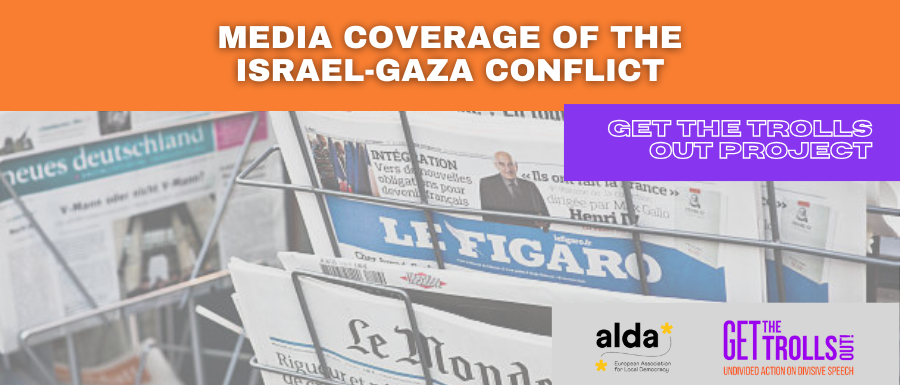The report is now available also in French (🇫🇷), click on the button at the end of the article to discover it! Le rapport est maintenant disponible en français (🇫🇷), cliquez sur le bouton à la fin de l’article pour le découvrir !
The project Get the Trolls Out, led by the Media Diversity Institute and the support of 6 partners across Europe, launched the report “Media coverage of the Israel-Gaza conflict across GTTO countries of operation” to analyse the massive wave of global news coverage surrounding the conflict, examining the social and political perspectives with which different media organisations have approached the events.
The project partners in Belgium, France, Germany, Hungary, Moldova, Poland and the UK evaluated coverage of the events, starting on October 7th 2023 to mid-July of 2024, analysing metrics such as bias in the reporting, the language used to describe the actors in the conflict, the depiction of the conflict itself and the reliance on generalisations and stereotypes.
In France, around 30 publications spanning the political spectrum were analysed, including left-wing outlets like Charlie Hebdo, centrist mainstream sources such as Le Monde and Le Figaro, and right-wing publications like Boulevard Voltaire and Valeurs Actuelles. In the UK, a similar strategy was applied, covering media from left- to right-wing perspectives. In Belgium, an equivalent number of publications were reviewed, focusing on mainstream outlets without regard to ideological bias. In Hungary, Poland, and Moldova, the research was more extensive, examining a high volume of headlines and articles, with a particular emphasis on xenophobic outlets in Poland.
The results revealed the presence of bias, and the use of offensive words, stereotypes and terminology
The evidence gathered by the transnational study revealed the presence and use of offensive wording and social stereotypes when reporting about the October 7th attack and the consequent invasion of Gaza.
In France and the UK, news outlets on the right side of the political spectrum tended towards a more favourable approach to the Israeli perspective. In contrast, left-leaning outlets were more aligned with the concerns of Palestinians and Gaza and had a more sceptical view towards Israel’s actions.
ALDA’s analysis of the French media landscape found that Le Figaro, Le Point, CNEWS, and Valeurs Actuelles (a traditionally right-wing outlet) provided balanced coverage of the Israel-Gaza conflict. However, the far-right outlet Boulevard Voltaire focused almost exclusively on actions perpetrated by Hamas. In contrast, moderate left-wing outlets like Le Monde presented Israel’s actions in a slightly negative light, while left-leaning outlets such as Marianne tended to report more favourably on Gaza.
After partners in the project’s six countries reviewed over 500 reports on the events in Israel and Gaza since October 7, 2023, findings indicate widespread biased reporting and the use of offensive, discriminatory language and stereotypes. While patterns varied by country, influenced by political context, historical traditions, and other biases, the widespread dissemination of such materials poses a risk of inflaming tensions in each participating country.
The project GTTO! aims to counter anti-religious hate speech across the European media landscape
The initiative identifies and responds to hateful narratives about Judaism, Islam, Christianity, and other religions across traditional and online media.
The partners involved in this report are The Media Diversity Institute (MDI) (UK), ‘NEVER AGAIN’ Association (Poland), The Independent Journalism Centre (IJC) (Moldova), The European Union of Jewish Students (EUJS) (Belgium), the Center for Independent Journalism (Hungary) and ALDA (France).
***
The report is now available also in French (🇫🇷), click on the button below to discover it!
Le rapport est maintenant disponible en français (🇫🇷), cliquez sur le bouton ci-dessous pour le découvrir !
